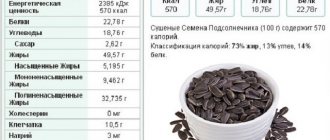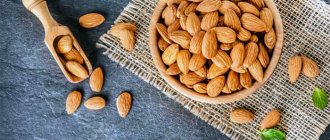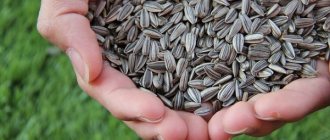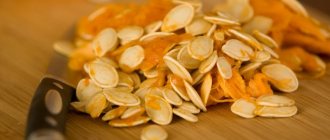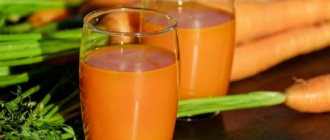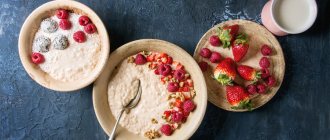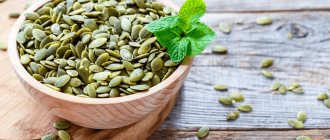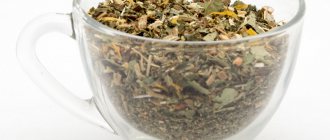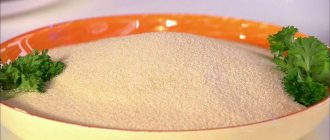Main characteristics
On sale you can find both the familiar black sunflower seeds and white sunflower seeds. White ones are larger in size and elongated in shape and have a hard skin. Otherwise, the composition of black and white seeds is the same.
Sunflower seeds are a natural source of vegetable protein, which is the main building material for the human body and a participant in metabolism. Every person wants to have a strong, healthy body, and seeds are a good helper for getting healthy protein mass. To get the right portion of the product, you should know the chemical composition of the seeds, their calorie content, benefits and harms.
Sunflower seeds are an affordable and popular product
Compound
Sunflower seeds contain mono- and polyunsaturated fats that are beneficial for the body, including Omega 3 and 6. Moreover, 100 grams of the purified product contains about 52%.
In addition, sunflower seeds contain vegetable protein (about 20 g per 100 grams of product), most of which are amino acids essential for the human body (tryptophan, methionine, isoleucine and cysteine), and a smaller part are non-essential aspargine and glutamine.
The seeds contain the least amount of carbohydrates – no more than 10 grams.
Calorie content 100 grams
The calorie content of sunflower seeds is 578 kilocalories per 100 grams of product in an unrefined form and 601 kilocalories in a peeled form. Calorie content of banana and mango.
What vitamins does it contain?
If we talk about the chemical composition of sunflower seeds, the record holder is vitamin E. In 100 grams of a purified product, it can contain 208% of a person’s daily dose.
Then it is worth noting the content of B vitamins. The seeds contain the most vitamin B1 (122.7% of the daily value), slightly less B6 (67.3%) and B9 (56.8%) and the least vitamins B5 and B2, their in seeds 20%. The seeds contain just as little vitamin C. The mineral composition of sunflower seeds is also worth noting. If you eat 100 grams of raw seeds every day, you can provide the body with: copper (108% of the daily dose), magnesium and selenium (98 and 96%, respectively), as well as phosphorus, manganese, zinc, iron, potassium and calcium.
Sunflower seeds "From Martin"
Some time ago, grandmothers sold roasted seeds. They measured them out with cut glasses and poured them into newspaper bags. Today you can buy seeds at any grocery store or supermarket. Manufacturers pack them in bright bags, the seeds are sorted by size, and salt and other flavoring additives are often added to them.
Sunflower seeds "Ot Martin" have the same calorie content as other types of sunflower seeds.
Let us remind you that 100 grams contain about 570 kcal.
Adding salt has no effect on this value.
By purchasing seeds in factory packaging, you can easily control the number of calories consumed, since the manufacturer indicates the calorie content and weight of the product.
Which is healthier – fried or raw?
Raw sunflower seeds have the greatest health benefits. Daily consumption of the raw product helps strengthen hair and nails and improves skin quality. The microelements contained in the seeds have a beneficial effect on the functioning of the gastrointestinal tract, improving digestion and promoting the removal of cholesterol from the body.
Seeds have a positive effect on the functioning of the cardiovascular system, strengthening the walls of blood vessels and thinning the blood. In addition, seeds are an excellent antidepressant that improves mood.
If we talk about fried seeds, they have both benefits and harm. As a result of frying, sunflower seeds lose some of their nutrients. This primarily applies to proteins and vitamins. Despite this, both proteins and fats are well absorbed by the body. The caloric content of fried sunflower seeds also remains quite high (from 350 to 570 kilocalories per 100 grams of product).
Despite the lower biological value of roasted seeds, they remain beneficial for the body - organic acids and useful minerals are preserved in the roasted seeds. In addition, during frying, pathogenic organisms die and aromatic substances are formed that cause appetite. It is because of this that fried sunflower seeds are useful for poor appetite and constipation.
It is not recommended to eat overcooked seeds; they do not bring any benefit to the body; they are only harmful; on the contrary, they are a source of excess calories and can cause exacerbation of stomach diseases (heartburn or gastritis). Bananas for gastrointestinal diseases.
Sunflower seeds on a diet
Sunflower seeds help those losing weight feel full longer, even with a strong reduction in caloric intake.
Is it possible to eat while losing weight?
Sunflower seeds are allowed in small quantities for weight loss. A person will have to ensure that the daily caloric content of the diet does not exceed the norm, and that the consumption of proteins, fats, and carbohydrates corresponds to the recommended ones.
Since seeds are high in calories, it is best not to eat too many of them. Add a few raw, sun-dried grains to salads, creamy soups, cottage cheese or smoothies.
You should not eat sunflower seeds fried in oil. With such heat treatment, calorie content increases and beneficial substances are destroyed.
Sunflower seeds are not recommended for gastrointestinal diseases.
Benefits and harms
Raw seeds have a number of beneficial properties:
- Due to the high fiber content, toxic substances and waste are removed from the body.
- Reduce blood cholesterol levels. Prevents the formation of atherosclerotic plaques on the walls of blood vessels, reduces the risk of heart attack and stroke.
- Stimulates intestinal motility. Accelerate metabolic processes.
- Contains omega-3 fatty acids. The substance is involved in lipid metabolism and stimulates brain function.
- The composition includes amino acids, including essential ones. The product is rich in protein.
- Due to the high content of fat-soluble vitamins A and D, they improve the condition of hair, nail plates, and skin. Increases visual acuity, strengthens bones and tooth enamel.
- Strengthen the immune system, accelerate regeneration processes.
The product may harm:
- If you crack the seeds with your teeth, the enamel will darken and begin to deteriorate. Possible formation of cracks and mechanical damage.
- When growing sunflowers, pesticides and chemical fertilizers are often used. The seeds absorb harmful substances that negatively affect human health and can lead to the development of cancer pathologies.
- Fried product can cause heartburn and contribute to the development of gastritis and stomach ulcers.
- The seeds have a negative effect on the vocal cords and lead to loss of voice.
- Overeating may result in excess vitamin B6 in the body. The person becomes lethargic, apathetic, and brain activity is suppressed.
Contraindications
You will have to stop eating sunflower seeds if:
- allergic reaction, individual intolerance;
- peptic ulcer of the stomach or duodenum;
- gastritis, pancreatitis;
- stomach colic;
- gout
Benefits for women
Thanks to the rich chemical composition and the presence of active substances, classic sunflower seeds have a striking effect on the female body.
- A large amount of vegetable fats, vitamins and antioxidants prevent tissue aging and help eliminate cholesterol.
- Thanks to calcium, potassium and phosphorus, sunflower seeds improve the condition of the skeletal system and prevent the development of rheumatism.
- Microelements and B vitamins increase endurance and performance, have a beneficial effect on the gastrointestinal tract, cardiovascular and central nervous systems, promote the absorption of glucose and regulate cholesterol levels in the blood.
- Sunflower seeds are especially beneficial for pregnant women. Vitamin B9, which is part of them, is involved in the creation of new cells and promotes the proper development of the fetus.
To fully satisfy the body's need for vitamin E (helps maintain the beauty and health of the skin), it is enough to eat 40-50 grams of seeds per day. The benefits of pumpkin seeds for women, can they be consumed during pregnancy and breastfeeding?
The benefits of sunflower seeds
- Strengthens the skin.
- Rich in vitamin A.
- Rich in vitamin E.
- Rich in vitamin D.
- Serve as an excellent prevention of atherosclerosis.
- They serve as excellent prevention of myocardial infarction.
- Significantly reduce cholesterol levels in the blood.
- The seeds contain a lot of zinc.
- Lots of fluoride.
- Lots of iodine.
- Improves vision.
- Strengthens the muscles of the heart.
- They help to “extinguish” the craving for a cigarette.
- They are good at calming people down when they are stressed.
- The seeds contain a lot of magnesium.
- Promote wound healing.
- Strengthens damaged bones.
- Significantly improves appetite.
- They help to distract from the problem that is oppressive.
- “Take away” from the state of anxiety.
- Strengthen nails and hair.
Sunflower seed diet
The goal of any weight loss technique is to reduce calorie intake, causing the body to burn fat deposits to provide the energy it needs to maintain physical and mental performance.
A sunflower seed diet helps reduce your daily calorie intake. The seed diet is a simple hunger strike. For breakfast - low-calorie porridge cooked in water, and for lunch, dinner and snacks - sunflower seeds. They completely replace other products, so it seems that going through a hunger strike with seeds is as easy as shelling pears. In fact, it is psychologically difficult to endure such a diet - despite the availability of seeds, the body will begin to lack the substances necessary for its work.
If you look at the composition of the diet from the point of view of its effectiveness, doubts creep in: is there any benefit from a diet based on sunflower seeds, or is it harmful? Seeds are a fairly high-calorie product, and given that most of their nutrients come from fats, it is difficult to lose weight on such a diet. But, if you consume a limited amount of seeds, the calorie content of your diet will decrease, followed by a decrease in body fat and body weight.
To get the desired result, you should follow a number of rules:
- Cook porridge exclusively in water, without flavorings or oil.
- Every day, drink at least two liters of clean water (you can use mineral water without gas).
- In addition to water, you can drink unsweetened green or herbal tea.
- Avoid physical exercise. If there is a lack of protein in the diet, the body will begin to burn muscles, and this is unacceptable.
- Divide the amount of seeds prepared per day (about 100 g) into 5-6 times, including breakfast. By eating such small portions, the body will not have time to get very hungry, and the digestive system will not malfunction and get rid of accumulated waste in a timely manner.
With the help of a diet based on seeds, you can get rid of 5-7 kilograms in a week.
Whether there is a banana diet - you will find out from the article. Flaxseed oil and ginger for weight loss.
Which seeds are best for weight loss?
All types of seeds can benefit the body, so it is worth including these products in your diet. Sunflower seeds contribute to the proper functioning of the heart muscle and strengthen the nervous system. It is better to get rid of the husks using a blender operating at low speeds.
Pumpkin seeds are higher in calories, so nutritionists do not recommend eating more than 20 g per day.
They contain many rare trace elements. The product is especially useful for girls, as it has a beneficial effect on the organs of the reproductive system and female hormonal levels.
Do they help with blood pressure?
There is no proven evidence that sunflower seeds help with hypertension. Sunflower seeds, rich in vegetable protein, vitamins and microelements, have a general positive effect on the body, but do not help with blood pressure.
However, traditional medicine has one simple and useless recipe for a decoction that is supposedly useful for hypertension. It is easy to prepare:
- the seeds in the peel must be washed well;
- put them in a container and fill with 2 liters of clean water;
- simmer over low heat for two hours;
- strain, cool and drink in small portions throughout the day.
Hypertensive patients can consume the seeds in any form - fried (not salted), raw or sprouted, as well as in combination with other plant substances. There will definitely be no harm from this. Ginger and blood pressure.
How to eat seeds when losing weight
Whether you can eat seeds while losing weight depends on the choice of product.
Raw or fried
During the diet, it is better to eat raw kernels. They are lower in calories and contain more nutrients. Heat-treated seeds are too fatty. Their calorie content is similar to the energy value of 2 full meals.
What time of day is there
It is better to consume kernels in the morning. This way they have time to digest by evening. There are several opinions about whether or not you can eat seeds in the afternoon. Nutritionists do not recommend doing this, since the product does not have time to be digested, can create heaviness in the stomach and discomfort, and interfere with sleep.
How often can you
Small quantities of seeds are allowed daily. It is better to alternate varieties to diversify your diet.
Beneficial properties for men
Thanks to a complex of microelements, biologically active substances and vitamins, sunflower seeds have certain benefits for men, contributing to the treatment and prevention of various diseases:
- thanks to the zinc content, the functioning of the thymus gland is stabilized and spermatogenesis is improved;
- magnesium helps stabilize metabolic processes and normalize metabolism;
- potassium and phosphorus stabilize the cardiovascular system and prevent heart attack;
- vitamins and microelements increase the tone of the cellular structures of the skin and hair;
- amino acids and polyunsaturated acids slow down cell aging, promote the removal of cholesterol from the body and prevent the formation of cholesterol plaques.
Sunflower kernels also have a psychotherapeutic effect. Hulling the seeds promotes relaxation, and by treating your interlocutor you can win his favor. Before introducing sunflower seeds into your daily diet, any man should understand that they are not only beneficial, but can also be harmful. The beneficial properties of seeds can fade into the background if consumed in excessive quantities and after improper processing. How to treat prostatitis with pumpkin seeds?
Is it possible to eat with pancreatitis?
One of the causes of pancreatitis (inflammation of the pancreas) is the abuse of heavy foods. Therefore, with pancreatitis, it is necessary to follow a strict diet not only during exacerbations, but also during periods of remission. The place of fatty, salty and fried foods in the diet should be taken by boiled and steamed foods.
Roasted sunflower seeds are strictly prohibited for consumption if you have pancreatitis. There are several reasons for this:
- they are high in calories;
- they contain a lot of fat;
- they are hard and difficult to digest;
- take a long time to digest.
Raw sunflower seeds are much healthier and can be consumed during remission (no more than 2 tablespoons per day and no more than twice a week). The seeds can also be added to baked goods. Is it possible to eat bananas if you have pancreatitis?
Strengthening or weakening?
The human body digests certain foods differently. Products that are easily absorbed by the body contain practically no fiber, do not stimulate the intestines to work and, as a result, strengthen it. In contrast, foods with coarse fibers and those rich in fiber cause the intestines to actively contract to push food forward.
Sunflower seeds belong to the category of foods that weaken.
Magnesium, which is part of the seeds, stimulates the intestinal walls, which eliminates stool retention. Oils provoke contractions of the gallbladder and the production of bile. The rough structure of the chewed kernels irritates the intestinal walls, contributing to its rapid emptying.
Thanks to their chemical composition, sunflower seeds not only do not strengthen, but can also gently relieve constipation, being used as a natural laxative.
Pumpkin seeds for weight loss
Pumpkin seeds are recommended to be included in the diet when losing weight.
Composition and beneficial properties
Pumpkin seeds contain:
- vitamins of group B, C, E, H, K, PP;
- potassium;
- calcium;
- silicon;
- magnesium;
- phosphorus;
- chlorine;
- iron;
- iodine;
- cobalt;
- manganese;
- copper;
- molybdenum;
- selenium;
- fluorine;
- chromium;
- zinc;
- fatty acid;
- amino acids.
The product has a number of useful properties:
- Improves mood, used in Eastern medicine as a remedy for depression.
- Normalizes intestinal motility. Helps remove toxic substances and waste from the body.
- Stimulate metabolism, accelerate the absorption of vitamins, minerals from food and the process of breakdown of proteins, fats, carbohydrates.
- Normalize hormonal levels. Promotes proper functioning of the thyroid gland and prevents an increase in fat deposits.
- They have a mild diuretic and laxative effect.
- Fatty acids participate in lipid metabolism, stimulate brain activity, and improve the condition of the skin.
- Pumpkin oil accelerates the production of the satiety hormone. Thanks to this, it is possible to increase the intervals between meals without feeling hungry.
- Linolenic acid strengthens artery walls.
Harm and restrictions
Roasted, salted pumpkin seeds can be harmful if consumed in excess.
They provoke the development of pathologies of the gastrointestinal tract, cause heartburn, and can cause nausea, heaviness in the stomach, and discomfort. Excessive consumption provokes the deposition of salts in the joints. You will have to refuse to introduce the product into your diet if:
- poor intestinal permeability;
- gastritis;
- increased acidity;
- acute form of inflammatory diseases of the gastrointestinal tract;
- stomach ulcer;
- individual intolerance, allergic reaction.
Pumpkin seeds contain many beneficial microelements.
Contraindications for use
Rich in fats, amino acids and vitamins, sunflower seeds not only have many beneficial properties, but also a number of contraindications:
- In case of pancreatitis and disorders of the gastrointestinal tract, the abuse of seeds is unacceptable - they can cause exacerbation of diseases.
- Seeds have a negative effect on the vocal cords, so people whose activities involve singing should consume seeds with caution.
- For people with individual intolerance and allergies to sunflower seeds, eating fried or raw kernels is strictly prohibited.
- High blood pressure and a tendency to edema are a contraindication for fried seeds with salt.
Sunflower seeds have no place in the diet of infants. After a year, they can be gradually introduced into the menu, carefully monitoring the appearance of negative reactions.
Possible harm to the body
Any product has both useful qualities and not so much. But are sunflower seeds harmful? If you consume them in moderation, 40-50 grams per day, they will not cause much harm. But overuse of sunflower seeds can harm the body. Being a high-calorie product, they can contribute to excess weight gain. Overweight people should eat no more than 20 g per day.
The habit of cracking shells with your teeth can lead to damage to tooth enamel and the subsequent development of caries. Peeling dirty, unwashed, raw seeds can cause stomatitis.
If there are no contraindications, sunflower seeds can be safely eaten daily. The benefits of sunflower oil.
Harm and contraindications
To prevent eating white seeds from causing harm to your health, you must avoid overeating them, otherwise this can lead to gaining extra pounds. It is not recommended to eat more than 50-100 grams of seeds per day.
To extract the kernel, the husk must be split using fingers, not teeth, this will protect against damage to the enamel and protect the oral cavity from possible microtraumas. If the choice fell on roasted seeds, this method will prevent the ingress of excessive amounts of salt, which manufacturers use in the manufacture of the product.
Restrictions on the use of white sunflower seeds:
- Overweight;
- Stomach or duodenal ulcer;
- Gastritis.
How to store at home?
In order for sunflower seeds to retain their beneficial properties for as long as possible, a number of simple conditions for storing them at home should be observed. Only ripened seeds in the peel are suitable for long-term storage. It protects the kernels from the negative effects of the environment (when in contact with air, fats quickly oxidize) and is removed just before use.
To extend the shelf life of seeds, they should be washed and dried in air or in an electric dryer. To dry completely, it is enough to dry them for 15-20 minutes at a temperature of about 80 degrees.
Dry seeds should be scattered into fabric bags or paper bags. If you place them in plastic bags, the seeds will quickly turn rancid and spoil.
Seed bags can be placed:
- in a cool, dry place where they can be stored for about 6 months;
- into the refrigerator compartment for fruits and vegetables, where raw seeds will be well preserved throughout the year.
Roasted and peeled seeds are best stored in the refrigerator in paper bags. In this form, they will retain all the beneficial substances that were not destroyed by frying for three months. It is best to store sunflower seeds in their raw, unpeeled form, carefully protecting them from excessive moisture and heat.
